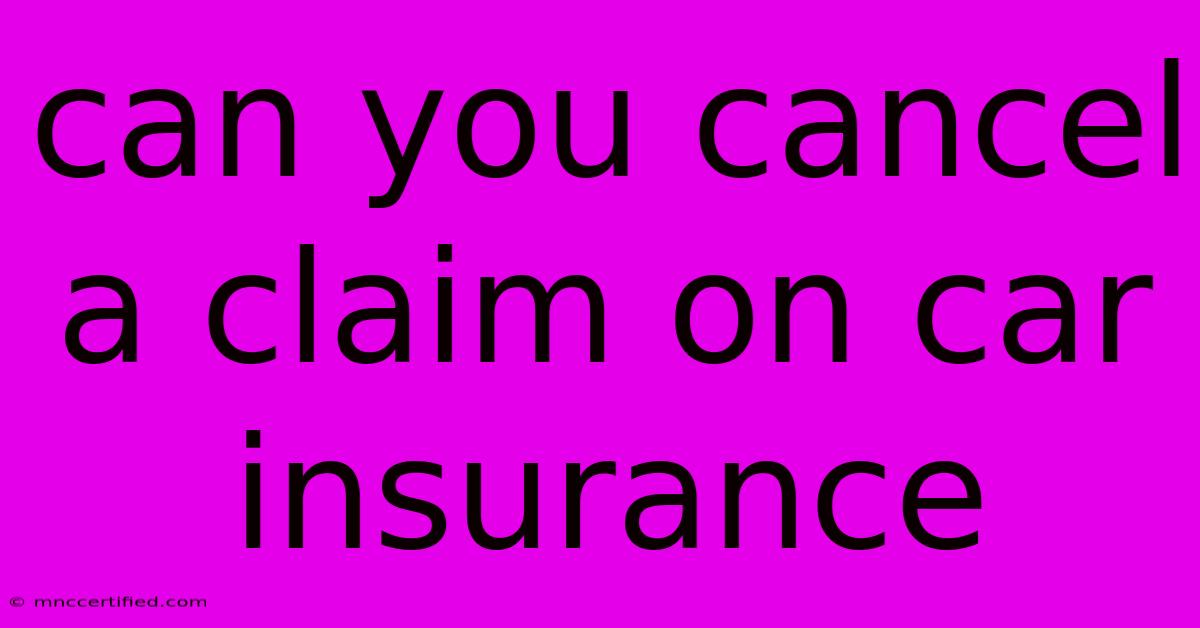Can You Cancel A Claim On Car Insurance

Table of Contents
Can You Cancel a Claim on Car Insurance?
It's a stressful situation: you've been in an accident, filed a claim with your car insurance company, and now you're having second thoughts. Maybe the damage isn't as bad as you initially thought, or you've found another way to cover the repairs. You might be wondering: can you cancel a car insurance claim?
The answer isn't a simple yes or no. It depends on several factors, including your insurance provider, the stage of the claim process, and the specific circumstances of your situation.
Understanding the Process
Before we delve into the details, let's clarify the stages involved in a typical car insurance claim:
- Reporting the Accident: You notify your insurance company about the accident, providing details like the date, time, location, and parties involved.
- Claim Filing: You file a formal claim with your insurer, providing all relevant information and supporting documentation.
- Investigation: The insurance company investigates the claim to verify the details and assess the damage.
- Settlement: If your claim is approved, the insurer will determine the amount they will pay for repairs or other losses.
Can You Cancel Your Claim?
The short answer is, yes, you can often cancel a car insurance claim, but it's not always straightforward. Here's a breakdown of the factors to consider:
1. Stage of the Claim Process:
- Early Stage: If you've only just reported the accident and haven't filed a formal claim, you can usually withdraw your claim without any complications. Simply contact your insurance provider and inform them of your decision.
- Claim Filed: If you've already filed a claim, it becomes more complex. Your insurer may have already started their investigation, and cancelling the claim may require their approval.
- Settlement Reached: If a settlement has been agreed upon, you'll likely need to reach a formal agreement with your insurer to cancel the claim. This may involve returning any payments received.
2. Your Insurance Provider's Policy:
Every insurance company has its own set of rules and procedures for claim cancellations. Some may be more flexible than others. It's crucial to review your policy document carefully to understand your insurer's specific guidelines regarding claim withdrawal.
3. Impact on Future Premiums:
Cancelling a claim could potentially impact your future car insurance premiums. Depending on your insurer's policies, they may still consider the accident in your claims history, even if the claim was cancelled.
4. Legal Considerations:
If the accident involves another party, you should be aware of any legal implications before cancelling your claim. It's advisable to consult with an attorney to ensure you understand your rights and obligations.
How to Cancel Your Claim:
- Contact Your Insurance Company: Reach out to your insurer and inform them of your intention to cancel the claim. Be clear and concise in your communication.
- Provide Reasons: Explain your reasons for withdrawing the claim. This could be a change in your situation, a misunderstanding about the extent of the damage, or a decision to cover the costs yourself.
- Follow Instructions: Your insurance company will guide you through the cancellation process. They may require you to submit specific forms or documentation.
Alternatives to Cancelling a Claim:
If you're hesitant about cancelling your claim entirely, consider these alternatives:
- Partial Claim: You might be able to file a claim for specific repairs or damages, while choosing to cover other costs yourself.
- Negotiate Settlement: If the insurer has determined an initial settlement amount, you can negotiate a lower payment or seek a different form of compensation.
Conclusion:
Whether you can cancel a car insurance claim depends on several factors. While it's generally possible, it's essential to understand the implications and follow the proper procedures. It's always best to communicate clearly with your insurance company and seek legal advice if needed. Remember, every situation is unique, so it's crucial to consult your policy documents and reach out to your insurer for specific guidance.

Thank you for visiting our website wich cover about Can You Cancel A Claim On Car Insurance. We hope the information provided has been useful to you. Feel free to contact us if you have any questions or need further assistance. See you next time and dont miss to bookmark.
Featured Posts
-
Europa League Man United Vs Paok Livestream
Nov 08, 2024
-
Life Insurance Policy For Grandchildren
Nov 08, 2024
-
Sancho Transfer Chelseas Missed Opportunity
Nov 08, 2024
-
Why Did Germanys Government Fall
Nov 08, 2024
-
Therapist That Accept Ambetter Insurance
Nov 08, 2024